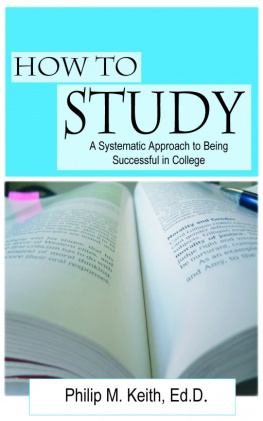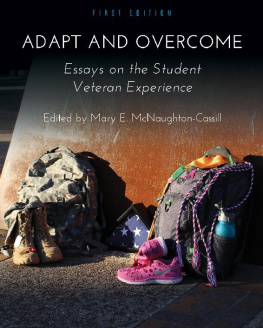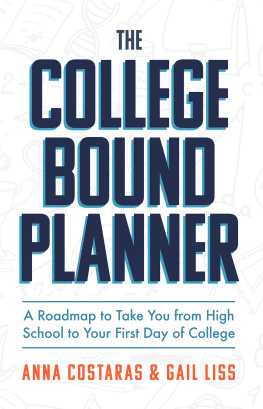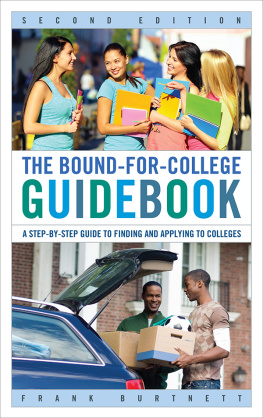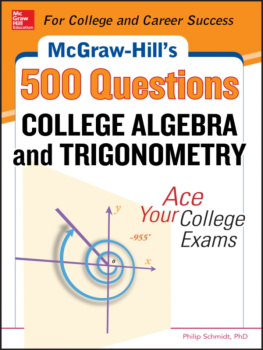HOW TO STUDY
A Systematic Approach to Being Successful inCollege
Philip M. Keith, Ed.D.
Text Copyright Philip M. Keith 2014
All Rights Reserved
Introduction
Getting Ready!
Be Engaged: PreparationMatters
Going to Class
Maintaining Your System
Parting Words
Preface
Congratulations on deciding to pursue yourcollege degree! As a college graduate myself, I can relate to howamazing and overwhelming the first steps can be when you are firststarting out. There's a lot to get done. Maybe you're a freshmanand this is your first year in the dorms. Or maybe you are anolder, nontraditional student who is balancing family life whilepursuing your dream. Maybe you're the first person in your familyto attend college. Whatever the case may be, we both know thatattending college is a major life challenge... and a lot ofwork. But one thing is for sure, by the time you are finished youwill have achieved a major accomplishment in your life, somethingyou can treasure forever. That's why I have written this book,because I recognize that the college experience can add a lot toyour life... not just because it's a degree, but because it isan EXPERIENCE! And because it's an amazing challenge.
This book is designed to change the way youthink about studying in college. It focuses on the things that youcan do to improve your own learning experience. It provides youwith insight about your role as a student. And it helps you developa good plan for completing the college courses ahead of you. Theone thing this book is not is a quick fix. There are no shortcutsto being successful in school, and I make no claims that this bookwill provide you with any easy answers. Studying is work. Learningis work. Getting good grades is work. Those things you have tounderstand. What I can say is that by time you finish this book,you will have a lot of good direction on what you need to do toface the challenge of being successful in your college courses.This book uses a systematic approach to learning. If you spend timereading, studying, and thinking about the information I'veprovided, you will undoubtedly have a new perspective on how totackle the learning challenges you're going to face. There's nodoubt you are going to be a success in college. Good luck!
Introduction
There are four goals I want to accomplishwith this book. The obvious goal is to help improve the way youstudy, by providing you with a new focus on the concept of studyingin general. What I hope is that by reading this book you will walkaway with a new perspective on what it means to study. For toolong, students have been partaking in old time rituals that involvehiding away in the deepest and darkest regions of some tenth-floorcubicle where they work hard to commit to memory certain facts,figures, and concepts associated with a particular subject. Thistime-honored tradition of gathering information and then tryingyour best to cram it into your brain inlast-minute fashion, so you might pass a midterm or final exam, hassadly been the standard-practice for many college students for manyyears. My goal for this guide on studying is to change the way youthink aboutor perceivethe notion of studying, and, that by doingso, hopefully you will then be able to abandon the torturouspractice of cramming.
More than anything, I want you to understandthat studying is not a onetime act of getting together withfriends or staying up late reviewing notes that youve scribbledinto some notebook somewhere; but what you have to understand isthat studying is a process that includes a variety of actsoccurring over a specific period of time. You can no longer thinkabout studying as a onetime deal; in order to improve your grades,you have to realize that studying involves more than the ten hoursyou spend the night before an exam. Instead, you have to realizethat studying is about work-over-time.
The second goal I have is to teach you thatone of the most important things you can do to improve yourstudying skills is to take control of your own processes forlearning; that is to say, that by reading the information that I amproviding you, you will ultimately realize that studying is aboutlearning and that learning is really an active process thatrequires you to take action and apply your own skills in order tolearn and retain the information that your teachers want you tolearn. When you take responsibility for learning, then you becomean active member in the process and are no longer a passive vesselthat someone else is trying to fill with information. My belief isthat in order for true learning to occur, the learner must assumesome active role in the process and abandon the old practices ofpassive learning that have for many years been perpetuated by thetraditional teacher/student relationship.
Think about this: most people have had atleast one good teacher in their life. What generally separates goodteachers from the bad teachers is that, for some reason or another,good teachers understand that learning is an active process, andthat students generally have to be active with or interacting withthe information being taught in order to understand and retainit.
New concepts can hardly be learned when ateacher is standing in front of the classroom spouting off about aparticular subject or idea. The real way that we learn in life isby taking part in activities and participating in events that allowus to learn through experience. Good teachers make learning fun;they are able to do this because they make the informationinteresting and are able to completely engage the student in theprocess.
Good teachers are also able to teach studentsto take responsibility for learning. When you take responsibilityfor learning, and when you assume an active role in the process oflearning, you are ultimately taking control of your own destiny,you are taking control of whether or not you will pass or fail anyor every exam or course you take while you are in college.
This is probably scary for some peoplebecause not only does it place the burden for learning in the handsof the learner, but it also forces the learner to accept someresponsibility for failure. This book is designed to help youimprove the way you learn so that you might avoid failure; however,if you are not yet willing to accept responsibility for your ownlearning, then you are probably not ready to accept the informationcontained within these pages.
With this book, I hope you learn to thinkdifferently about studying. I also hope that you use what you learnand apply it to your life in a manner that will allow you to getthe best out of your education. In order to achieve success youwill have to become a responsible learner, and you will also haveto realize that studying is a process that requires your activeparticipation.
The third thing I hope you attain from thisbook is the idea that to study is to work; no matter how youapproach studying, you will have to invest some degree of your ownenergy and sweat over a specific amount of time in order to achievethe primary goal of academic success. Nothing comes easy, and ifyou think that there is some magic answer that will cut all thecorners and provide you with a quick and effortless method forstudying, then this is not the book for you.
This may seem a bit gloomy (and perhapsblunt), and you may, at this very moment, be wondering why you haveeven bothered to pick up this book; and it may very well be amistake for you to continue reading if you think that what iscontained within these pages is the golden ticket for study andacademic success; however, I do assure you that if you at leastconsider, with some degree of enthusiasm, the ideas that I am goingto provide to you, and if you spend some amount of time thinkingabout how to apply these new strategies to your own life, then youwill undoubtedly improve the way you study, the way you learn, theway you take tests, the way you read... and, ultimately, youwill improve your grades.

